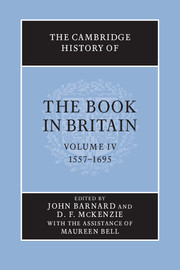Book contents
- Frontmatter
- Dedication
- Contents
- List of illustrations
- List of contributors
- Preface
- Acknowledgements
- Introduction
- RELIGION AND POLITICS
- ORAL TRADITIONS AND SCRIBAL CULTURE
- LITERATURE OF THE LEARNED
- 6 The Latin trade
- 7 Patronage and the printing of learned works for the author
- 8 University printing at Oxford and Cambridge
- 9 Editing the past: classical and historical scholarship
- 10 Maps and Atlases
- 11 The literature of travel
- 12 Science and the book
- 13 Samuel Hartlib and the commonwealth of learning
- 14 Ownership: private and public libraries
- 15 Monastic collections and their dispersal
- LITERARY CANONS
- VERNACULAR TRADITIONS
- THE BUSINESS OF PRINT AND THE SPACE OF READING
- BEYOND LONDON: PRODUCTION, DISTRIBUTION, RECEPTION
- DISRUPTION AND RESTRUCTURING: THE LATE SEVENTEENTH-CENTURY BOOK TRADE
- STATISTICAL APPENDICES
- Abbreviations
- Bibliography
- Index
- Plate Section
- References
9 - Editing the past: classical and historical scholarship
from LITERATURE OF THE LEARNED
- Frontmatter
- Dedication
- Contents
- List of illustrations
- List of contributors
- Preface
- Acknowledgements
- Introduction
- RELIGION AND POLITICS
- ORAL TRADITIONS AND SCRIBAL CULTURE
- LITERATURE OF THE LEARNED
- 6 The Latin trade
- 7 Patronage and the printing of learned works for the author
- 8 University printing at Oxford and Cambridge
- 9 Editing the past: classical and historical scholarship
- 10 Maps and Atlases
- 11 The literature of travel
- 12 Science and the book
- 13 Samuel Hartlib and the commonwealth of learning
- 14 Ownership: private and public libraries
- 15 Monastic collections and their dispersal
- LITERARY CANONS
- VERNACULAR TRADITIONS
- THE BUSINESS OF PRINT AND THE SPACE OF READING
- BEYOND LONDON: PRODUCTION, DISTRIBUTION, RECEPTION
- DISRUPTION AND RESTRUCTURING: THE LATE SEVENTEENTH-CENTURY BOOK TRADE
- STATISTICAL APPENDICES
- Abbreviations
- Bibliography
- Index
- Plate Section
- References
Summary
The publication of the bull Regnans in excelsis in 1570 had many unexpected side effects, one of which was to inaugurate a native school or habit of scholarship. Isolation in intellectual matters, hitherto the accidental product of geography, was now enforced. If the main and immediate effect was theological, in creating the need for a firm and sustainable base for the Church of England, it also brought about a significant change in thought about the history of the country. With these changes went a new independence of mind (not always beneficial) that spread to classical and legal studies, to mathematics and science–in short, a new approach to the medieval omne scibile. Previously, English scholars had felt themselves part of a European commonwealth of letters. Erasmus’s English friends, William Grocyn, Thomas Linacre, John Colet, William Lily, Thomas More, looked abroad for company, and for the means of publication. Linacre, like Erasmus, worked at the Aldine press; More’s Utopia was first published at Louvain, the second edition and his Epigrammata by Froben at Basel; Cuthbert Tunstall’s De arte supputandi was printed and reprinted at Paris. Their work was part of the Erasmian concept of bonae litterae, in which textual scholarship was only part, as much devoted to the spread of learning by translation, from Greek to Latin or Latin to the vernacular, and by practical works, such as grammars and manuals. They bought their books abroad, as Bishop Richard Foxe and John Claimond did for Corpus Christi College, Oxford. They saw their primary task as educational: Richard Croke, the first Greek reader at Cambridge, Sir Thomas Smith and Roger Ascham, his successors, and Sir John Cheke, the first Regius Professor of Greek, were all important figures in public life, equally well known abroad.
Keywords
- Type
- Chapter
- Information
- The Cambridge History of the Book in Britain , pp. 206 - 227Publisher: Cambridge University PressPrint publication year: 2002
References
- 2
- Cited by

